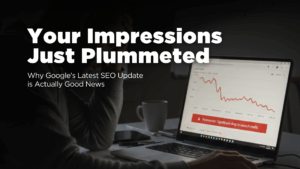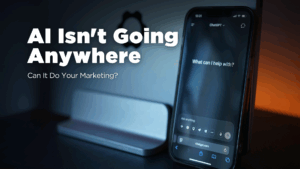Let’s talk about websites: Should you have one?
Short answer? Absolutely. But let’s talk about why.
We get it—today’s digital world feels like it’s ruled by social media. TikTok, Instagram, LinkedIn… everywhere you turn, brands are showing up on someone’s feed. So, if you’re a business owner or entrepreneur, you might be wondering: “Do I really need a website anymore?”
Spoiler alert: Yes, you do. And not just any website—a smart, strategic one that turns clicks into clients.
Here at Adapting Social, we’ve helped hundreds of brands go from invisible to unforgettable with websites that don’t just look good—they convert. In this blog, we’re breaking down exactly why your website is still one of the most powerful assets in your digital arsenal (and what you’re leaving on the table if you don’t have one).
Let’s get into it.
Does Making a Website Still Matter?
In a time when digital marketing feels fast, fluid, and often social-first, it’s easy to question whether having a dedicated website is still necessary. The truth? It’s not just necessary—it’s essential.
Here’s why your site still holds so much power in 2025.
1. A Website Expresses Your Unique Brand
A website remains the most effective platform for articulating a brand’s core values, mission, and culture.
Unlike social media profiles constrained by platform-specific templates and algorithms, websites offer complete creative freedom to integrate logos, color schemes, typography, and multimedia elements that reflect a brand’s personality.
For example, luxury brands like Equinox use immersive virtual tours and high-resolution visuals on their websites to convey exclusivity and sophistication—a level of customization unattainable on third-party platforms. This autonomy ensures consistency across all touchpoints, reinforcing brand recognition and emotional connection with audiences.You’re in charge of how it’s presented. This consistency reinforces credibility, helps your audience connect emotionally, and sets your brand apart in a crowded digital landscape.
2. It’s Not Just a Site—It’s a Storytelling Platform
Modern web technologies have transformed websites from static brochures into interactive experiences.
Elements like parallax scrolling, embedded videos, and dynamic content flows allow you to build journeys that captivate and guide visitors with intention. According to a 2025 study by Nine Blaess, these immersive experiences increase dwell time by 40% compared to traditional social feeds—and higher engagement often means higher conversion.
Unlike algorithm-driven platforms that decide what content gets seen and when, your website puts you back in control. You can strategically place calls to action, optimize user paths, and build frictionless funnels from first click to conversion.
Take our project for Euphoria Vacation Homes, for example—their intuitive, visually rich redesign delivered a smooth, immersive experience that elevated both brand perception and usability.

3. Websites Drive Long-Term Visibility Through Search
People often check out a business online before they ever make contact and your website is Social media drives bursts of visibility. Websites drive sustainable growth.
According to BrightEdge, 53% of all web traffic comes from organic search—meaning people are actively Googling for what you offer. A website built with SEO in mind lets you show up for those searches without constantly paying for ads.
And it’s not just one-and-done traffic. Evergreen content—like a well-optimized blog post or FAQ page—compounds in value over time. Unlike a post that disappears in 48 hours, your website content keeps working long after it’s published.
4. It’s a Trust-Building Tool That Instantly Validates Your Brand
Your website is often the first place someone goes to see if you’re legitimate. And that impression forms fast.
Nielsen reports that 75% of people judge a business’s credibility based on its website. A site that’s modern, clean, and user-friendly communicates trust, professionalism, and authority—especially when it includes elements like testimonials, certifications, and clear service info.
It’s a level of reassurance that helps you stand out in competitive markets, particularly for new or growing businesses.
5. You Own the Data—and the Experience
On your website, you’re in control. You choose what to track, what to optimize, and how to use your data. You’re not subject to sudden policy changes or visibility limits imposed by third-party platforms.
This is more than a technical benefit—it’s also a legal one. With privacy regulations like GDPR and CCPA in full force, having control over your contact forms, cookies, and analytics ensures compliance and builds consumer trust. Your site is not only a marketing tool—it’s a secure, transparent environment for your users.
6. It Centralizes Your Content—and Powers Your Marketing Campaigns
While social media is great for engaging audiences in the moment, websites act as the backbone for all your marketing efforts.
Think long-form blogs, resource hubs, and downloadable guides. Think product catalogs that are searchable and shareable. According to Outbrain, 68% of consumers prefer to access detailed product info via websites rather than social platforms—because they trust the source.
And when you’re running campaigns on platforms like TikTok, Instagram, or via email, your website becomes the perfect destination. Custom landing pages tailored to your offers help eliminate friction and increase conversion rates—turning clicks into action, and curiosity into customers.
We saw this firsthand with Your Fresh Kitchen, where our website overhaul not only boosted brand visibility but also streamlined the online ordering process—making it easier for users to engage and convert.

7. Modern Websites Evolve with Your Audience
Today’s users expect fast load times, smooth navigation, and mobile-first experiences. With Google’s 2025 updates penalizing clunky or outdated sites, performance and accessibility aren’t optional—they’re essential.
But beyond speed, today’s websites are smart and intuitive. They feature AI chatbots that assist visitors in real-time, AR tools that let customers preview products, and even voice search optimization. These innovations help you meet your audience where they are—and stay one step ahead.
As a 2025 case study by Lounge Lizard revealed, a furniture retailer boosted sales by 25% simply by implementing AR product previews on its site. It’s proof that websites remain at the forefront of digital innovation.
Your Website Helps You Show Up in AI-Powered Search
Search is evolving—and fast. With the rise of AI-powered discovery tools like Google’s AI Overviews, your website plays a vital role in ensuring your business stays visible in AI-generated search results.
Source for AI-Generated Answers
AI search tools scan the web to find trustworthy, relevant sources to include in their responses. If your website contains high-quality content that directly answers common queries in your field, it’s more likely to be selected as a featured source. Being included in an AI-generated summary can drive significant visibility and traffic to your site—without relying on traditional rankings alone.
SEO and Ranking Factors Still Apply
Even in AI-powered search, the fundamentals of SEO remain crucial. Algorithms assess factors like content relevance, page experience, and E-E-A-T (Expertise, Authoritativeness, Trustworthiness). Without a website, your business has no foundation to demonstrate these key signals, meaning AI systems may simply overlook you as a credible option.
Control and Optimization Capabilities
Owning your website means you control how your content is structured and presented—two things AI systems depend on. Implementing schema markup, optimizing metadata, and targeting specific search intent helps AI better understand what your site offers. These technical optimizations make it easier for algorithms to surface your pages in relevant AI-powered answers.
Feeding the AI With Data
AI doesn’t just guess—it learns from data. And websites provide that data. From content depth to internal linking to user engagement, every interaction with your site gives algorithms a clearer picture of your authority and relevance. The more high-quality, meaningful content you create, the more data you feed into the system—improving your visibility in AI-driven rankings.

Your Website Is Still One of the Most Powerful Assets You Own
While social media plays a vital role in capturing attention and building community, your website remains the core of your digital strategy. It’s where your brand story lives, where search engines (and AI) find and rank your content, and where your marketing efforts convert into measurable results. In 2025, a high-performing website isn’t a luxury—it’s a non-negotiable for any brand that wants to compete, convert, and grow.
If your website isn’t pulling its weight—or if you don’t have one yet—it’s time to change that. At Adapting Social, we design and develop websites that don’t just look incredible, they drive real results. From strategy and UX to SEO and integrations, we help businesses like yours turn visitors into customers.
Ready to build something powerful? Let’s talk.




